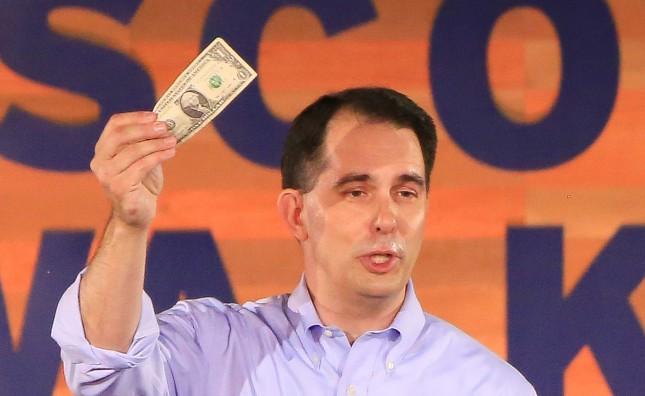A report released by the Wisconsin Taxpayers Alliance showed Gov. Scott Walker’s most recent budget will have the largest spending imbalance in the past decade.
According to the report, the 2017-19 budget features increases in spending on K-12 education and a $233 million spending imbalance. WTA research director Dale Knapp said even though the budget’s spending imbalance is unusual, it will not have long-term effects.
“It’s unlike a lot of budgets over the last 15 years in that spending in the second year is greater than ongoing revenues,” Knapp said. “That imbalance sort of carries over and so there’s going to be, barring a major recession, additional tax revenues in that next biennium.”
Knapp said a portion of the expected additional tax revenues have already been claimed to rebalance revenues and expenditures.
University of Wisconsin public affairs and applied economics professor Andrew Reschovsky said this imbalance is “not wise budgeting” and pointed to the chance of economic downturn.
“At some point, the economy is going to turn down,” Reschovsky said. “Wise budgeting would be that in a period where you have good economic growth, you try to grow your rainy day fund, grow your balance.”
Reschovsky said this is common in Walker’s budgets. In the past, the “rainy day” funds have been used for tax cuts, he added.
The budget imbalance, however, will not be a problem as long as there is no economic downturn, Knapp said.
“As of right now, you’ve got an economy that’s growing fairly steadily, so if the economy continues to grow into the next budget, it’s not going to be much of a problem,” Knapp said. “We’ve been in an economic expansion for quite a while now, should the economy turn, then it becomes more of a problem.”
But, both Reschovsky and Knapp believe there will be less funding available for investing throughout the state of Wisconsin.
In an email to The Badger Herald, State Sen. Lena Taylor’s legislative aide Jordan Krieger said the budget imbalance will have negative effects on Wisconsin families.
“The spending imbalance will create uncertainty around key programs that help Wisconsin families,” Krieger said. “Meanwhile, the continuation of corporate tax credits and incentive packages will only increase taxpayers’ liabilities down the line.
Krieger pointed to Foxconn as one such corporate incentive which increases taxpayer burden and emphasized the need to invest in Wisconsin’s infrastructure and higher education.
Murky waters: Foxconn deal brings economic opportunity, environmental concerns
The report outlined K-12 aid will be the largest biennial increase in spending on K-12 education since 2005-07. Knapp said the biggest change in this budget is in increased funding for K-12 schools.
“If you look at his past budgets, there were cuts in his first one and then after that there were increases for K-12 schools but they were relatively modest, the increases in this budget are some of the biggest we’ve seen in a decade or so,” Knapp said.
This spending imbalance could have the consequence of decreasing funding for the UW System.
Krieger added that this budget is friendlier towards corporations than towards students.
“I’m afraid funding for our UW System, the diversity of coursework offered and the ability of students to complete their programs on time will be at risk as long as Governor Walker and the GOP continue to prioritize corporate interests over investing in our students,” Krieger said.
In wake of cuts to federal research funding, UW develops new research submission tool
Knapp said it is too soon to tell what the impact will be on the UW System.
The long-term effects of this budget are largely unclear due to the 2018 gubernatorial election.
“We don’t know, who’s going to be governor or if the Republicans are going to continue to control both houses of the legislature — if that changes, then everything budget wise changes,” Knapp said. “It’s really too early to say anything about impact on the UW System or the impact on K-12 schools.”



















